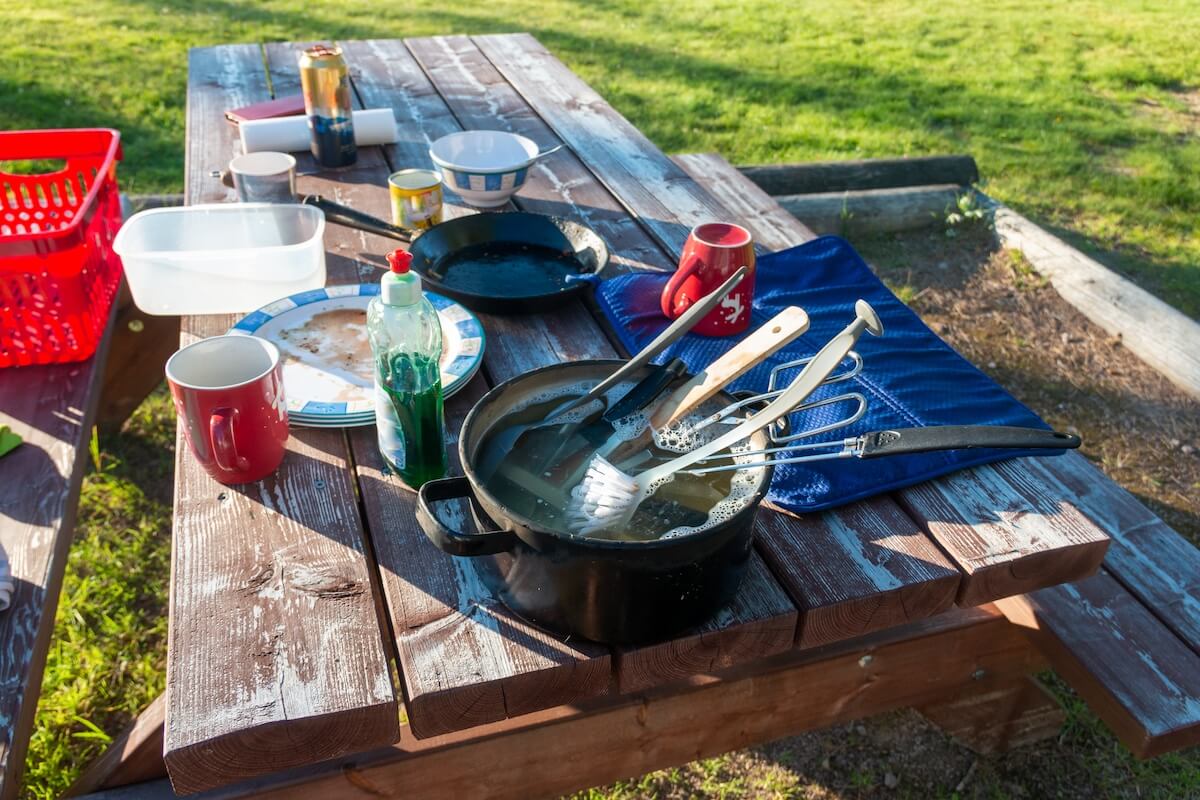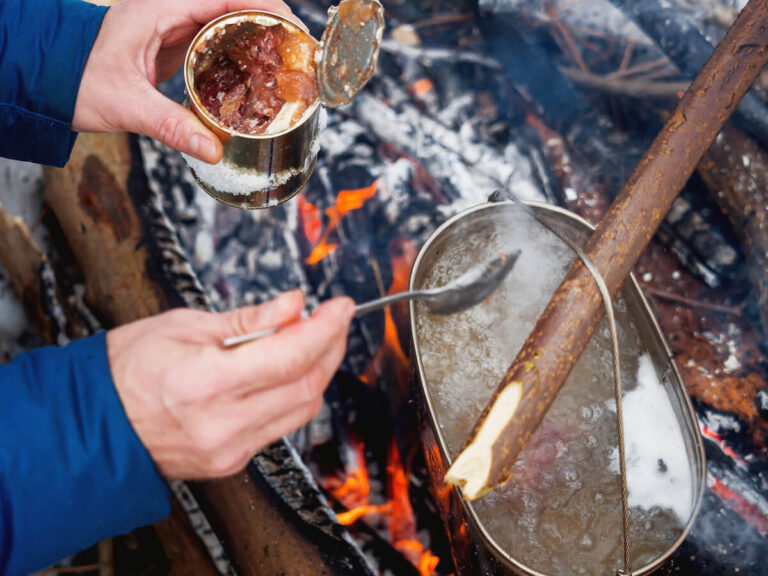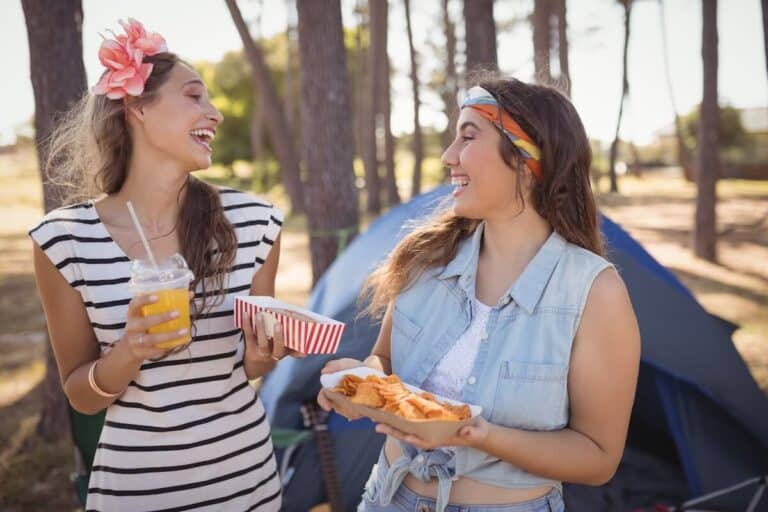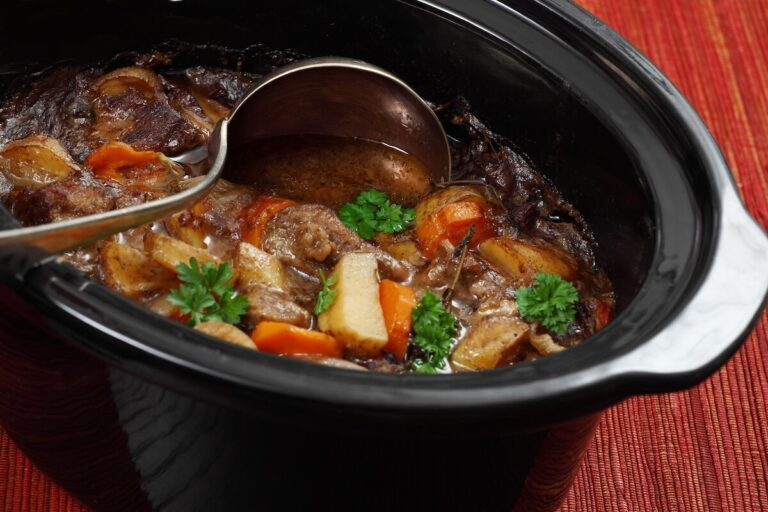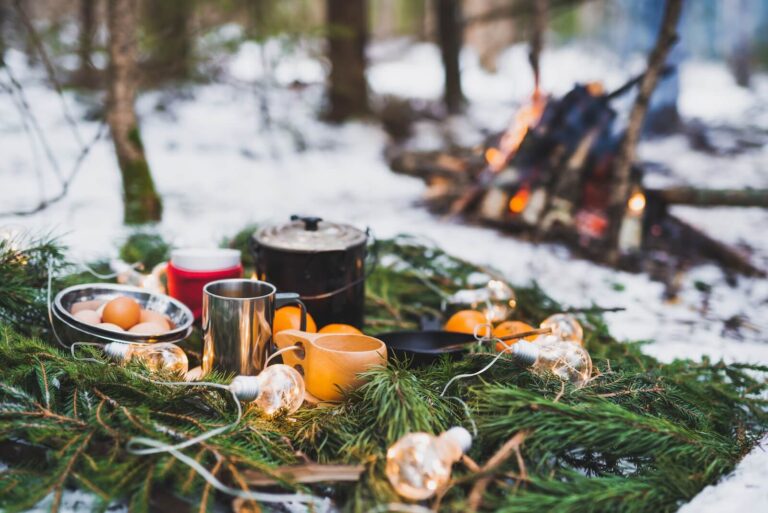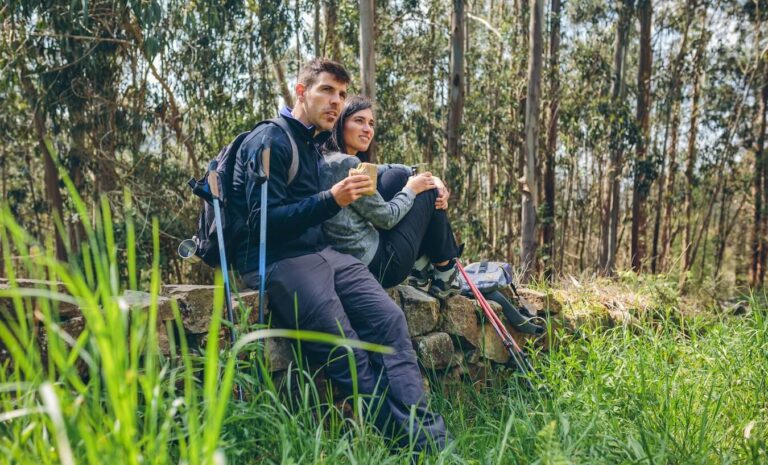Camping Food Packing List: Free Printable Camping Food Checklist
Heading on a camping trip soon? This is the ultimate camping food packing list and to make your trip prep even easier, we’ve even got a printable camping food checklist for you to make sure you don’t forget any of those essentials.
When you’re planning a camping trip, one of the most important things to consider is what food to bring. A well-planned camping food list can make all the difference in ensuring that you have enough food to last your trip and that you don’t forget any essential ingredients or cooking equipment.
So let’s make sure you do it right!
Essentials of a Camping Food Packing List
When planning for a camping trip, it’s crucial to create a comprehensive camping food packing list to ensure you have all the necessary items for your meals.
Your camping food packing list should be tailored to your specific needs and the style of camping. Consider factors such as the length of your trip, the number of people in your group, and any dietary restrictions or preferences.
You’ll also want to think about the type of camping you’ll be doing – car camping, backpacking, or RV camping – as this will affect the amount of food you bring and the cooking equipment you’ll have access to.

*This post may contain affiliate links, which means if you click a link and make a purchase, I earn a commission at no additional cost to you. Read my full privacy policy for more info.
Here are some essentials to include in your list:
1. Non-perishable Foods
Non-perishable foods are a must-have for camping trips. These foods don’t require refrigeration, and they have a longer shelf life than perishable foods. Many of these foods are also perfect for snacking on while hiking or for quick and easy meals.
- Canned goods (check out our guide to the best canned food for camping)
- Dried fruits
- Nuts or trail mix
- Beef jerky
- Energy bars
- Popcorn
- Chips
- Smores ingredients
- Pancake mix (without the wet ingredients added)
2. Fresh Food & Perishable Goods
Perishable foods like fresh fruits, vegetables, and meats can be a bit more tricky to pack for camping trips unless you’ve got somewhere to keep them chilled.
Make sure you have a reliable cooler or portable fridge that will keep your perishable foods chilled for the duration of your trip, or at least long enough to consume those foods at the start of your camping trip. Be sure to pack them in airtight containers or bags to prevent leaks and spills.
Dairy
- Milk
- Eggs
- Butter
- Cheese
- Dips
- Yogurt
Meat
- Sausages
- Lunch meat/sandwich meat
- Hotdogs
- Hamburgers
- Chicken
- Bacon
- Fresh fish or other seafood
Fruits & Vegetables
- Apples
- Oranges
- Bananas
- Other fresh fruits
- Tomatoes
- Potatoes
- Pre-cut vegetables
- Pre-made or bagged salad
Dry Goods
These foods do not need to be stored in a cooler, however, they do need to be eaten within a couple of days before they spoil:
- Hamburger buns
- Hotdog buns
- Bread
- Pita bread
- Wraps or tortillas
- Instant oats
- Rice
- Pasta
3. Spices and Condiments
Spices and condiments can make your camping meals taste better. Some of these need to be chilled, while others are shelf-stable and can be kept in a tub.
- Salt & pepper
- Ketchup
- Mustard
- Sugar
- BBQ sauce
- Cooking oil/non-stick cooking spray
- Hot sauce
- Mayonnaise
- Peanut Butter
- Honey
- Jam
5. Water and Beverages
Staying hydrated is crucial during camping trips, so be sure to pack enough water for your entire trip.
- Water
- Tea
- Coffee
- Juice
- Alcoholic beverages
- Cordial
- Hot chocolate mix
- Electrolytes (bottle or tablet form)
5. Cooking Equipment
When it comes to cooking equipment, a camp stove is a must-have. It’s a portable and convenient way to cook meals while camping. Additionally, you’ll need pots, pans, utensils, and a camping knife for your camp kitchen. If you plan to grill, you’ll need a portable grill or a campfire grill grate.
- Camp stove
- Fuel for stove
- Cookware (pots and pans)
- Cooking utensils (spatula, cooking spoon, tongs, ladle)
- Grill grate or campfire grate
- Campfire tripod and Dutch oven
- Plates, bowls, and mugs
- Eating utensils (forks, knives, spoons)
- Cups and drinking vessels
- Cutting board
- Knife
- Peeler and grater
- Food storage containers
- Ziplock bags
- Aluminium foil
- Mixing bowl
- Pie iron
- Portable coffee maker or coffee press (if needed)
- Bottle opener
- Can opener
- Cooler
- Ice packs
- Lighter/waterproof matches
- Water bottles
- Food thermometer
6. Cleaning Supplies
Cleaning supplies are essential for any camping trip. Pack biodegradable soap, a sponge, and dish towels to clean your dishes. Additionally, bring along trash bags to dispose of your garbage properly.
- Biodegradable soap
- Small scrubber or sponge
- Dishwashing basin
- Tea towels
- Trash bags
7. Meal Plan
Creating a meal plan is crucial when camping. It helps you pack the right amount of food and ensures you have a variety of meals. Be sure to include breakfast, lunch, dinner, and snacks in your meal plan. You can also plan ahead and pre-cook some meals to save time and effort.
By including these essentials in your camping food packing list, you’ll be able to enjoy delicious and nutritious meals while camping.
Planning Your Meals
When it comes to camping, planning your meals ahead of time is crucial. Not only does it save you time and effort during your trip, but it also ensures that you have enough food to sustain you throughout your adventure.
Start by creating a meal plan for your next camping trip. This plan should include all meals and snacks, as well as the time of day you plan to eat them. Consider simple meals that are easy to prepare and don’t require a lot of ingredients or equipment.
When planning your meals, make sure to take into account any dietary restrictions or preferences of those in your group. This will help you avoid any potential food-related issues during your trip.
To make your camping meals even more enjoyable, consider incorporating some delicious camp meals into your plan. There are plenty of recipes out there that are easy to make and taste great in the great outdoors.
When packing your food, make a list of all the ingredients you will need for each meal and snack. This will help you avoid forgetting anything important and ensure that you have everything you need to prepare your meals.
Overall, planning your meals ahead of time is key to a successful and enjoyable camping trip. With a little bit of preparation, you can enjoy delicious meals in the great outdoors without any stress or hassle.
Simple 3-Day Camping Meal Plan
Creating your own camping meal plan is definitely the best way to make sure you don’t forget anything. Write down your planned meals and snacks and then you can use this camping meal plan to create your grocery list. Pre-make your lunch for day 1 so you can have something quick and easy to eat after (or during) your camp set up.
Here is a simple camping meal plan:
Day 1:
Lunch:
- Sandwiches
- Trail Mix
Dinner:
- Hamburgers
- Hot Chocolate
- Toasted marshmallows
Day 2:
Breakfast:
- Breakfast beans (baked beans with bacon and eggs mixed in)
- Instant Coffee, Tea or juice
Lunch:
- Tuna Salad Wraps (Combine canned tuna with mayonnaise or dressing and wrap it in tortillas)
- Veggie sticks
- Granola Bars
Dinner:
- Campfire tacos
- Smores
Day 3:
Breakfast:
- Pancakes
- Fresh Berries
Lunch:
- Cheese platter and crackers
- Fresh fruit
- Chips
Dinner:
- Campfire Quesadillas
- Hot chocolate
- Sweet biscuits
This meal plan is straightforward and requires smile campfire cooking, making it perfect for a short camping trip or if you prefer to keep things easy in the great outdoors. Make sure to pack all the necessary ingredients and follow proper food safety practices while camping.
Choosing the Right Foods
When it comes to camping, choosing the right foods is crucial for a successful and enjoyable trip. You want to make sure you have enough food that is easy to store, prepare, and eat while also providing the necessary nutrients and energy for your outdoor activities.
When creating your comprehensive camping food list, consider including a mix of fresh and non-perishable food items.
Fresh fruits and vegetables are a great source of vitamins and minerals, while non-perishable food items like peanut butter, trail mix, and canned chicken can provide protein and healthy fats.
When packing raw meats, it is important to keep them separate from other food items to prevent cross-contamination. Consider using airtight containers or resealable bags to store your meats, and always cook them thoroughly before you eat them.
Dried fruits and dehydrated foods are also great options for camping since they save space in your cooler and are easy to pack with a long shelf life. Freeze-dried camping meals are another convenient option as they only require hot water to prepare.
Packing and Storing Food
When it comes to camping, packing and storing food is a crucial part of the planning process. You want to make sure that your food stays fresh and safe to eat throughout your trip. Here are some tips to help you pack and store your food properly.
Use Resealable Bags
Resealable bags are a great way to pack food items that need to stay fresh, such as fruits, vegetables, and snacks. They are also great for storing leftovers. Make sure to label the bags with the contents and date so you don’t forget what’s inside or how long it’s been in the bag.
Use a Separate Cooler
If you’re planning on bringing perishable items like meat or dairy products, it’s important to keep them in a separate cooler from your drinks. This will help prevent cross-contamination and keep your food at a safe temperature. Make sure to pack the cooler with plenty of ice or ice packs to keep the temperature in the safe zone.
Bring a Large Container of Water
Having a large container of water is important for both cooking and cleaning up. You can use it to wash your hands, rinse off dishes, and even refill your water bottles. Make sure to bring enough water for drinking and cooking, as well as some extra for emergencies.
Overall, packing and storing food for camping can be a bit of a challenge, but with these tips, you should be able to keep your food fresh and safe throughout your trip.
Best Tools for Cooking and Preparation
When it comes to preparing and cooking food while camping, having the right tools can make all the difference. Here are some of the best tools to bring along on your camping trip:
- Dutch Oven – A Dutch oven is a versatile cooking tool that can make a wide range of dishes, from stews and soups to casseroles and baked goods. It’s especially useful for cooking over an open flame or hot coals. Dutch ovens come in different sizes and materials, but a cast iron Dutch oven is a durable and reliable choice for camping.
- Aluminium Foil – Aluminum foil is a must-have for any camping trip. It can be used to wrap food for cooking over an open flame, as a makeshift plate or bowl, or to line a cooking surface to make cleanup easier. It’s also great for wrapping up leftovers or storing food in your cooler.
- Pie Iron – A pie iron is a fun and easy way to cook sandwiches, pies, and other treats over an open flame. It consists of two hinged metal plates that clamp together to cook the food inside. Pie irons come in a variety of shapes and sizes, but a classic square or round iron is a good place to start.
- Foil Packs – Foil packs are a simple and delicious way to cook food over an open flame. Simply wrap your ingredients in aluminium foil and place them on the coals or grill. Foil packs can be used to cook everything from vegetables and potatoes to fish and chicken.
Having these tools on hand will make preparing and cooking food while camping a breeze. Just be sure to pack them carefully and follow all safety guidelines when using them over an open flame.
Free Printable Meal Planner



Conclusion: Planning Your Camping Food List
When you’re camping, you don’t want to spend all your time cooking and cleaning up. That’s why it’s a great idea to pack some convenient and quick meal ideas that are easy to prepare and will keep you fueled for your outdoor adventures. This camping food packing list will help you plan simple camping meals and avoid forgetting any of those essential ingredients!
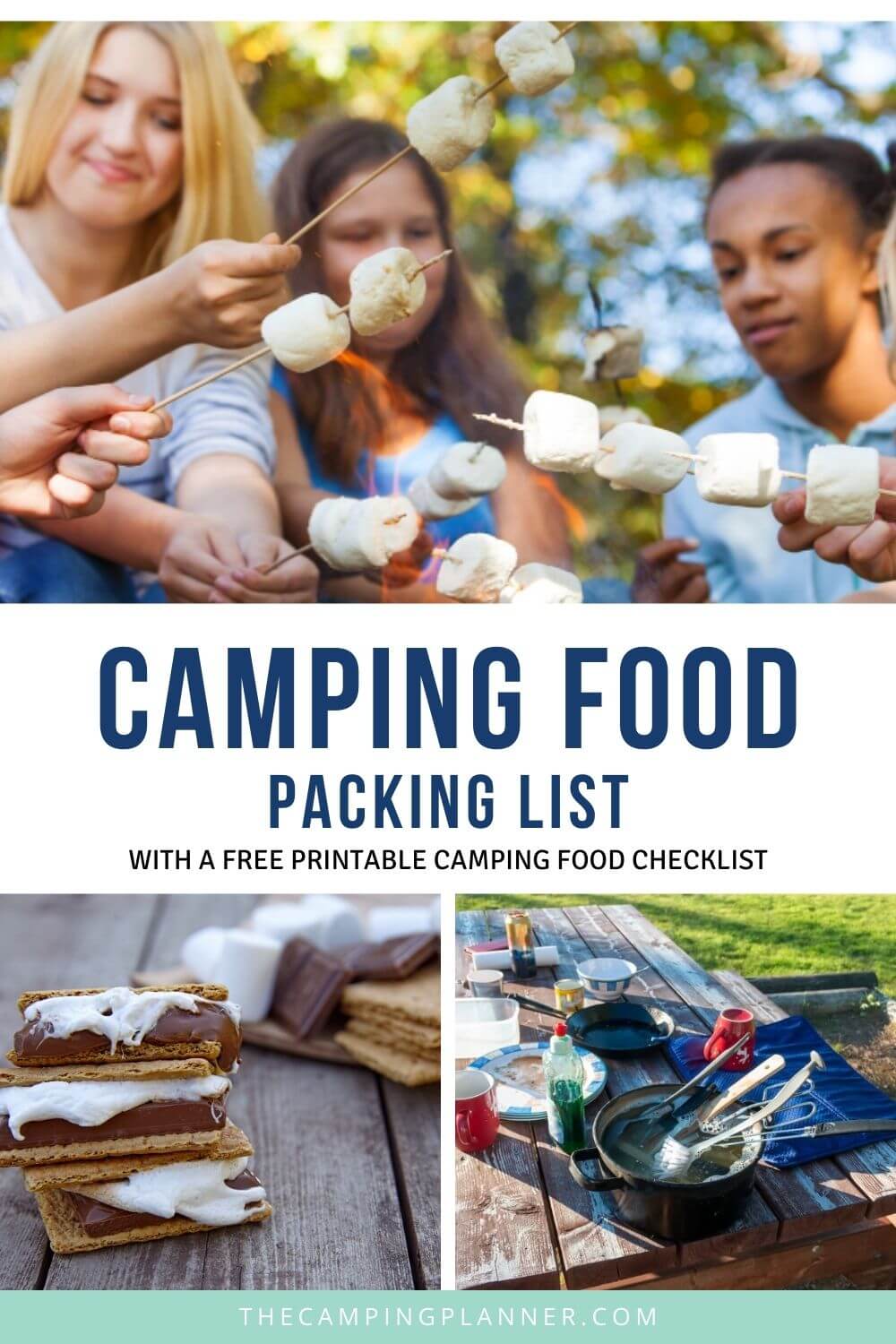
For more camping food tips:

